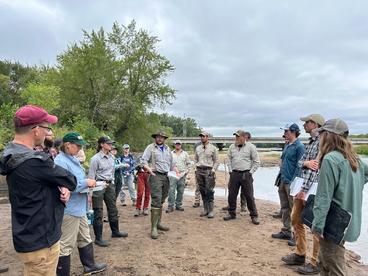
The following are strategies related to decision science included in the Midwest Climate Adaptation Science Center's 2023-2026 Science Agenda.
- 1.4. Determine optimal design and placement of culverts and fish passage structures to protect aquatic habitat and connectivity under future precipitation patterns.
- 3.8. Evaluate the efficacy of in-lake, landscape, and watershed management to protect the quality and function of wetland, stream, and lake ecosystems.
- 4.6. Identify optimal future habitat (e.g., refugia, connectivity to) for at-risk or priority species.
- 5.1. Assess the feasibility and effectiveness of current and potential ecological restoration goals under future conditions.
- 5.2. Advance climate-informed optimization of protected lands for fish, wildlife, ecosystems, and cultural resources.
- 5.3. Conduct assessments to reduce the risks and measure the effectiveness of assisted migration activities.
- 5.4. Provide climate-informed decision science in the selection, application, and siting of restoration and ecosystem management (e.g., prescribed burning, water control, grazing, siting, and seed selection/planting).
- 5.8. Inform the design of monitoring programs and early warning systems to detect and respond to climate change.
Read the full Science Agenda.
